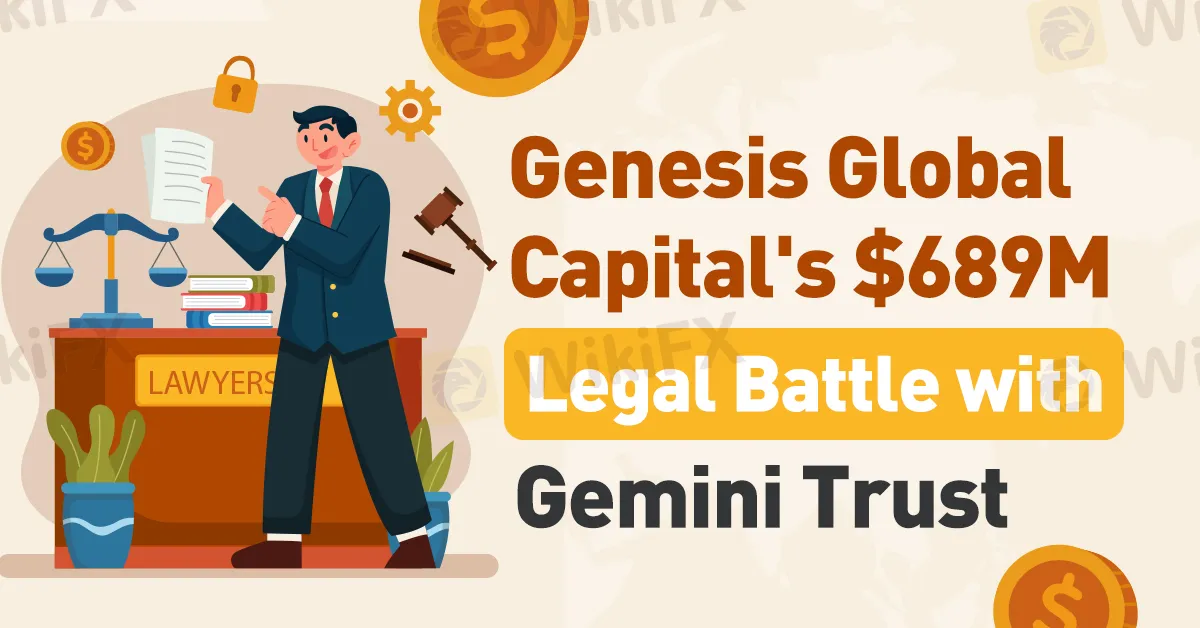简体中文
繁體中文
English
Pусский
日本語
ภาษาไทย
Tiếng Việt
Bahasa Indonesia
Español
हिन्दी
Filippiiniläinen
Français
Deutsch
Português
Türkçe
한국어
العربية
Genesis Global Capital's $689M Legal Battle with Gemini Trust
Abstract:In a tumultuous legal battle within the crypto world, Genesis Global Capital, a bankrupt crypto lender, has taken legal action against Gemini Trust Company, seeking to reclaim nearly $689 million in what it terms as preferential transfers, further intensifying the already heated feud between these entities.

Genesis Global Capital, a bankrupt crypto lender, has initiated legal action against Gemini Trust Company and participants in the Gemini Earn Program, aiming to recover what it claims as preferential transfers totalling around $689 million.
This lawsuit comes on the heels of the termination of an agreement permitting users to lend digital assets to Genesis via Geminis platform.
In the court filings, Genesis, a subsidiary of Digital Currency Group, alleges that Gemini executed significant withdrawals during a crucial 90-day preference period preceding Genesiss bankruptcy proceedings in January. These withdrawals are labelled “avoidable transfers” in the filing, contending they disadvantaged other creditors, as stated by Genesis.
Seeking recourse under the United States Bankruptcy Code, the lawsuit endeavours to place the defendants in line with other creditors of Genesis who did not benefit from these preferential transfers.
The legal feud between the two crypto entities has escalated since FTX's collapse in November 2022, sparking a very public dispute involving both CEOs. At the heart of the conflict lies the fund recovery issue, with accusations flying between the companies regarding non-cooperation and looming legal consequences.

Earlier, Gemini had taken legal steps against Genesis to access Grayscale Bitcoin Trust shares utilized as collateral for loans extended to Genesis through the Gemini Earn program, currently valued at about $1.6 billion.
Part of Genesiss bankruptcy proceedings, the lawsuit aims to assert its claim over the GBTC shares pledged as collateral. The argument posits that gaining control of these shares would fully safeguard and address the claims of all its Earn customers, who encountered frozen funds when Genesis suspended withdrawals last year.
Genesis's bankruptcy has severely impacted the Gemini Earn program, sparking a string of lawsuits, including Geminis suit against Digital Currency Group and its CEO Barry Silbert, alleging fraudulent activities. Conversely, Genesis has counter-sued DCG, seeking repayment of loans surpassing $600 million.
Amid this ongoing dispute, U.S. regulatory bodies have intervened. The SEC previously accused Genesis and Gemini of selling unregistered securities, while the New York Attorney General filed a lawsuit accusing DCG, Genesis, and Gemini of defrauding investors.
The court filing implies that market disturbances triggered by events like the collapse of Terraform Labs and Three Arrows Capital led to Gemini's withdrawals from Genesis, contributing to what is described as a “run on the bank” scenario. These actions are now scrutinized for potential preferential and avoidable outcomes, given Genesis's financial situation during that period.

Disclaimer:
The views in this article only represent the author's personal views, and do not constitute investment advice on this platform. This platform does not guarantee the accuracy, completeness and timeliness of the information in the article, and will not be liable for any loss caused by the use of or reliance on the information in the article.
Read more

How Crypto Trading Transforms FX and CFD Brokerage Industry
Explore how crypto trading reshapes FX and CFD brokerage with innovative products, liquidity solutions, and regulations in 2025.

Why More People Are Trading Online Today?
Discover why online trading is booming with tech, AI, and a push for financial freedom. From stocks to crypto, it’s a thrilling hustle for all.

SEC Ends Crypto.com Probe, No Action Taken by Regulator
The SEC has closed its investigation into Crypto.com with no action taken. Crypto.com celebrates regulatory clarity and renewed momentum for the crypto industry.

Interactive Brokers Expands Crypto Trading with Solana, XRP, Cardano, and Dogecoin
Interactive Brokers adds Solana, XRP, Cardano, and Dogecoin to its platform, enabling U.S. and U.K. clients to trade crypto 24/7 with low fees.
WikiFX Broker
Latest News
How Crypto Trading Transforms FX and CFD Brokerage Industry
UK would not hesitate to retaliate against US tariffs - No 10 sources
FCA Warns Against 10 Unlicensed or Clone Firms
CySEC Warns Against 14 Unlicensed Investment Websites
Top Currency Pairs to Watch for Profit This Week - March 31, 2025
Will natural disasters have an impact on the forex market?
Philippines Deports 29 Indonesians Linked to Online Scam Syndicate in Manila
Navigating the Intersection of Forex Markets, AI Technology, and Fintech
Exposed: Deceptive World of Fake Trading Gurus – Don’t Get Fooled!
AI-Powered Strategies to Improve Profits in Forex Trading
Currency Calculator







